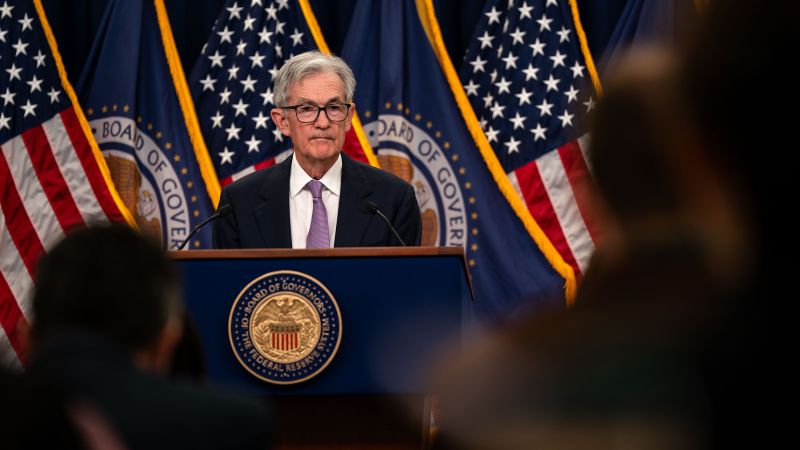New York
CNN
—
Imagine you’re at a job you love but you have a boss you just really don’t get along with. You stick it out, though, because, after all, it’s your dream job. Then one day your boss leaves and everything starts to get a whole lot better.
And then, you find out they’re coming back.
That’s essentially what Federal Reserve Chair Jerome Powell is experiencing with President-elect Donald Trump’s return to the White House.
Barely 48 hours after Trump had been named president-elect, the tension was already evident during Powell’s Thursday press conference after the Fed’s two-day monetary policy meeting.
When a reporter asked the Fed chair if he’d resign if Trump asked him to, Powell didn’t miss a beat.
“No,” he replied curtly, without elaborating on that question.
Another reporter subsequently asked if a president could fire or demote him.
“Not permitted under the law,” Powell fired back. “Not what?” the reporter responded. “Not permitted under the law,” said Powell, a lawyer himself, this time pausing for emphasis after each word.
The tone and brevity of his answers to the two reporters marked an obvious shift from the thoughtful responses he typically has when fielding questions from reporters.
If Trump’s second term is anything like his first, Powell could be in for a steady stream of personal attacks, insults and threats. Powell made it abundantly clear Thursday he won’t be having any of it.
His message to Trump: Go ahead, make my day.
Even though Trump gave Powell the equivalent of a promotion in 2018 when he appointed him to serve as head of the US central bank in 2017, Powell doesn’t actually answer to him or to President Joe Biden, who reappointed him for another term as Fed chair that expires in 2026.
If Trump, or any president for that matter, were to try to remove a Fed chair, they would encounter a steep uphill battle.
That’s because the head of America’s central bank can only be fired for “cause.” The exact interpretation of what would constitute a for-cause firing has not been precisely defined, but it’s quite reasonable to assume that it would entail a lot more than just having policy differences with the president.
Ultimately, the Supreme Court could have the final say on what merits a “for cause” firing of a Fed chair. But while that fight, which would probably be lengthy, plays out, Powell would likely still get to stay in his job until May 15, 2026, when his term expires.
Nevertheless, Trump threatened to fire Powell on several occasions when he was first president.
After markets tanked at the onset of the pandemic in March 2020, Trump told reporters he had the “right to remove (Powell) as chairman,” adding that “he has, so far, made a lot of bad decisions, in my opinion.” While Fed officials pay close attention to financial markets, they don’t make monetary policy decisions based on stock levels, in part because they can move up or down for reasons that have nothing to do with the level of interest rates.
Now, Trump appears keen to allow Powell to complete his term. But he may be readying for another fight: getting Fed chairs to consult with him on interest rate decisions.
“I feel the president should have at least a say in there. I feel that strongly,” Trump said at a press conference in August, referring to the Fed’s interest rate decisions. “I made a lot of money. I was very successful. And I think I have a better instinct than, in many cases, people that would be on the Federal Reserve — or the chairman.”
That would be a blatant violation of the Fed’s congressionally mandated duty to make decisions independently from elected officials, which it has respected for more than 70 years.
It’s unclear if Trump, or any president, could remove the Fed’s independence on his own, or if it would require congressional approval. Representatives from the Trump campaign did not respond to CNN’s request for a comment, while a Fed spokesperson declined to comment.
If Trump decides to challenge it, though, the chances of him potentially getting his way may have improved with Republicans poised to control both the House and the Senate. On top of which, six of the nine Supreme Court justices were appointed by Republican presidents.
After a barrage of backlash, including from Bloomberg’s editorial board, Trump later sought to soften his prior comments. “A president certainly can be talking about interest rates, because I think I have very good instincts,” Trump said in a Bloomberg News interview less than two weeks after he claimed he deserved a say.
“That doesn’t mean I’m calling the shot, but it does mean that I should have a right to be able to talk about it like anybody else,” he said.
He made similar claims a month ago at an event hosted by the Economic Club of Chicago. “I have the right to say I think you should go up and down a little bit. I don’t think I should be allowed to order it, but I think I have the right to put in comments as to whether or not interest rates should go up or down.”
His comments were met with silence from the crowd.

